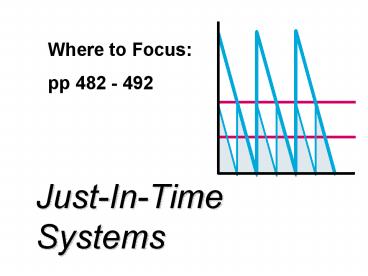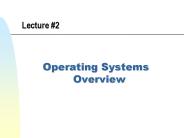Just-In-Time Systems - PowerPoint PPT Presentation
1 / 17
Title:
Just-In-Time Systems
Description:
Just-in-time (JIT): A highly coordinated processing system in which goods move ... of the use of equipment, facilities and human activities in an organization ... – PowerPoint PPT presentation
Number of Views:59
Avg rating:3.0/5.0
Title: Just-In-Time Systems
1
Just-In-Time Systems
Where to Focus pp 482 - 492
2
TQM and JIT
- Just-in-time (JIT) A highly coordinated
processing system in which goods move through the
system, and services are performed, just as they
are needed - JIT program emphasizes quality at the source
- Also known as Lean Manufacturing
- Pull method of materials flow
- Less inventory to hide defective items
- Smooth production rates result in less rushing
and fewer errors
3
JIT Goals and Building Blocks
4
Pull Systems
- Pull system System for moving work where a
workstation pulls output from the preceding
station as needed. (e.g. Kanban)
5
Organization Wide Commitment to JIT
- Elimination of Waste and Variance
- Waste anything that does not add value to the
product - Can no longer have
- Faulty components from suppliers
- Poorly trained and improperly selected employees
- Poor condition of equipment
- Badly targeted performance measures
- Inadequate capacity
- Damage in shipping and storage
6
Estimated Benefits
- 80 to 90 reduction in inventory investment
- 80 to 90 reduction in manufacturing lead times
- 75 reduction in rework and setup
- 50 reduction in space requirements
- 50 reduction in materials handling equipment
7
Kanban Production Control System
- Kanban Card or other device that communicates
demand for work or materials from the preceding
station - Kanban is the Japanese word meaning signal or
visible record - Visibility cards, lights, less inventory
- Authority to pull, or produce comes from a
downstream process.
8
Inventory Reduction Goals
- Material is always moving, always being worked
on, always having value added to it, rather than
just standing still.. accumulating costs
9
Scheduling
Where to Focus pp 770 - 784
Time
Jobs
10
Manufacturing Execution Systems
- Used by fortune 500 manufacturers to link and
integrate MRP systems with shop floor systems - Provides real time operational information
- Benefits include reduced cycle times, shorter
lead times, reduced WIP, and improved on-time
delivery performance
11
Manufacturing Process
12
Scheduling
- Scheduling Establishing the timing of the use of
equipment, facilities and human activities in an
organization - Effective scheduling can yield
- Cost savings
- Increases in productivity
13
Performance Measures
- Job flow time Time of completion - Time job was
available for first processing - Makespan Time of completion of last job -
Starting - time of first job
- Past due
- amount of time job missed due date
14
Performance Measures
- Work-in-process inventory
- job in waiting line, moving, delayed, or
processed - Total inventory Scheduled receipts for all
items On-hand inventories of all items - Utilization Productive work time/Total work
time available
15
Dispatching Procedures
- Earliest due date
- First come, first served
- Shortest processing time
16
Sequencing
Single-Dimension Rules - EDD
Average job flow time 23 hours
Average hours early 0.6 hours
Average hours past due 7.2 hours
Average WIP 2.61 returns
Average total inventory 2.68 returns
17
Sequencing
Single-Dimension Rules - SPT
Average job flow time 20.4 hours
Average hours early 3.6 hours
Average hours past due 7.6 hours
Average WIP 2.32 returns
Average total inventory 2.73 returns































